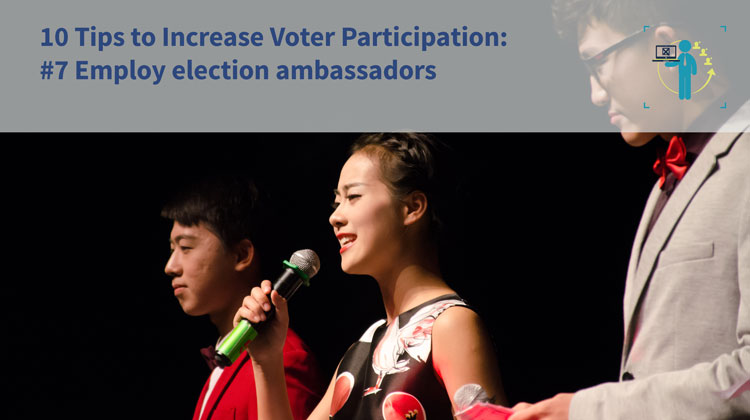
10 Tips to Increase Voter Participation: #7 Employ election ambassadors
In America, being invited to vote by celebrities is already a common practice. Stars from the music and film industries like Pharrell Williams, Clint Eastwood, Madonna or George Clooney ask fellow citizens – often through the internet and social networks – to participate in elections. Celebrities from Hollywood enjoy great admiration, and idols are emulated. The thought behind this type of PR is that others are joining along the road to the ballot box.
Various viral promotions have sprung up during past parliamentary elections in Germany as well. Through internet campaigns, posters and television spots, celebrities especially encouraged first-time voters to use their voice.
However, familiar faces being used for party purposes often has a negative aftertaste. After all, voters are supposed to be convinced by the contents and not the prompt to follow along. Yet general invitation to vote by so-called election ambassadors is unconditionally worthy of support – and you, too, can use these resources for yourself.
“The good example is not one way to influence other people, it is the only one.”
– Albert Schweitzer, German-French physician, theologian & philosopher, Nobel Peace Prize laureate –
How election ambassadors work
It has always worked like this: Man creates idols and places more value on the opinions of those whom he knows and trusts. Orientating oneself toward those who do something correctly entails less risk of making mistakes. It is thus almost a law of nature that people emulate other people. Individuals worth emulating may be well-known figures, or they may come from one’s social environment.
For this reason it is highly effective when individuals who possess some level of influence prompt others to exercise their right to vote. This works on both a large and small scale. Regardless of how many voters are involved in your election: By using ambassadors you can increase your voter participation.
Acquire election ambassadors
Essentially the best election ambassadors are those who are already participating in the vote. First address these voters and ask them to dedicate some time to the election. This can be done through various means. For instance:
- E-mails
- Flyers
- Social media posts
- Personal conversations
The important thing is that their dedication does not entail too much effort for the election ambassadors. You should also rely on “key people”, or individuals who have a good connection with the youth, who generally work in organising activities or who have a good network by nature because everybody gets along with them. If you ask these key people to support you, your message will be heard much more clearly.
Provide advertising materials
Even the most dedicated people need advertising materials, otherwise the election ambassador campaign won’t lead anywhere. For example, you can provide the following affordable advertising materials:
- Write a prepared e-mail, which you send to your election ambassadors. You can then add personal text and send it to your contacts or groups.
- Create flyers, stickers, buttons or similar items, anything that is easy to distribute. Tie up little packages of these advertising materials and hand them to your election ambassadors to distribute.
- Create a so-called social media visual. A visual is a graphic, e.g. with a message that is easily and quickly shared through social media channels. The optimal size of a visual, for instance for Facebook, is 1200 x 1200 pixels (additional image size recommendations for popular social networks). Send this graphic to your election ambassadors and ask them to share it through their own social media profiles.
You can implement a lot of ideas with your election ambassadors – from simple flyer distribution to a barbecue for networking or a meet-and-greet. Give your creativity free rein and ask others for additional ideas. Once you have gotten the attention of the voters, you will see the fruits of your labour manifest in increased voter participation.